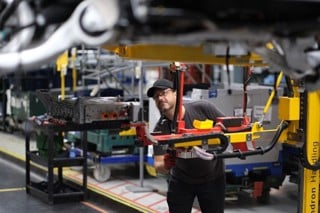New car sales figures, released today, show while month on month overall sales were down 3.5% compared to July last year, fleet purchases were up by 2.1% and by 3.3% over the year-to-date. However the market is on track to meet the full year forecast of 1.93 million.
Diesel registrations were just 53 units shy of last July's level and over the year-to-date have grown by over 35,000 units to account for 50.2% of the overall market and 52.4% of the July market, up from 44.0% and 50.6% respectively a year ago.
Vauxhall's Insignia was the top selling diesel in July, just ahead of the year-to-date best-selling VW Golf.
"New car registration figures fell marginally by 3.5% to 131,634 units in July, reflecting the impact of slower economic growth and subdued consumer confidence," said Paul Everitt, SMMT chief executive.
"Robust demand in the fleet sector helped to bolster weaker private demand. While the coming months remain challenging, performance in the second half of 2011 is expected to keep the market on course to reach around 1.93 million units."
David Raistrick, automotive partner and head of manufacturing at Deloitte, said: “Today’s figures whilst disappointing, come as no real surprise.
“Challenging economic conditions have resulted in both corporate and private buyers delaying large capital purchases and as the industry continues to be hit by a number of adverse circumstances, I believe new registrations will not exceed the two million mark, but more likely will reach around 1.9 million this year.
“Whilst these figures are seen as an important industry barometer, July is not regarded to be a key month of the year. I forecast that August will also show a decline, but all eyes will be on the industry’s September’s figures, when the new registration plates are issued.
“Car fleet operators in the corporate sector have held on to their cars for a longer period of time in an attempt to reduce costs. And, in the private sector, dwindling consumer confidence, brought on by fears around job security and increases in the cost of living is undoubtedly playing a part in weakening demand.
“Despite large swathes of both corporate and private buyers having postponed replacing their vehicles over the last year or so, there comes a tipping point where the reduced depreciation is offset by the increased running costs and reduced reliability associated with an older vehicle.
More follows on page two...






















Login to comment
Comments
No comments have been made yet.